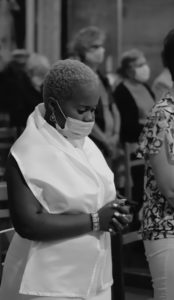Co-missioners,
On this seventh day of Christmas we send along a letter that popped into our editor’s inbox on Christmas Eve. It came from Michael Hoy, the editor of two posthumously published books by Robert W. Bertram. Mike has spent much of this year working hard on a book of his own, on the topic of hope. Along the way he has been reading deeply in Luther and Bonhoeffer. You’ll see the latter’s influence in the title of this timely and urgent reflection, with its fitting final word for this old, dying year.
Peace and Joy,
The Crossings Community
A Letter from My Own Coronavirus Prison
by Michael Hoy

In my last annual physical with my physician, which occurred in the middle of summer, both of us masked, I asked him how it was going working as a medical professional in the midst of the global pandemic. His response was to the point: “I wish people were a little less selfish.”
Sadly, I do not think that that has changed much, not simply since the rise of COVID-19, but since the fall of humanity, but I understand his concern—and even more so as I see the daily death tolls rising to all-time highs in American (and global) history. “COVID is not going to cost me my Christmas,” one woman said to a reporter as she prepared to board a plane for the holidays. Tell that to the doctors and nurses who will be working Christmas day and throughout the holidays trying to save the lives of (selfish? apathetic? foolish?) people, or those whom these same people have infected. Dr. Ashish Jha, two days before Christmas, said that the surge of hospital patients from the virus is becoming so overwhelming, that “there’s no room—there’s no room at the inn.”
The coronavirus pandemic provides us as a “teachable moment,” as Bob Bertram liked to say, which is too precious to be ignored. As one who has spent a great deal of my life trying to model my own teaching in his gospel-centered theology and spirit, here are a couple of words we need to hear and take to heart.
First, we might heed this time as a divine word of judgment.
The pandemic, to be sure, is a crisis today. Indeed, it is perhaps the most troubling evidence of what we might even call a “natural” crisis insofar as the COVID-19 cell, like all cellular life, is a part of creation, struggling to survive, even morphing into new forms for its own survival. “The Selfish Gene” is how Richard Dawkins described it. Yet it is also evidentially dangerous and deadly, for which we are looking for a solution. We have our best “natural” scientists working on it.
Meanwhile the pandemic has also taught us what we have seemingly failed to grasp otherwise, that in spite of all the isolation we may feel from its effect, we are not immune from something we are all in together. A pandemic is something that concerns “all the people” (pan-demos).
At the very least, we might conclude that it is a crisis; and the Greek root of the word “crisis” means, “judgment.” Perhaps we may ask, where is God? It is a fair question, this question of theodicy, that we ask in the most trying of times, and especially in the midst of catastrophic disaster. Many others have raised it in the throes of other such crises and disasters. The answer of atheists and agnostics—that there is no God and we are on our own—is only a retreat to the materialist world, one that is already contaminated by the greater crises that afflict humanity and creation.
Some Christians would also, perhaps too readily and without necessary caution, resolve the theodicy by answering that the pandemic is God’s judgment, unaware of how theologically dangerous it is to make such a claim in light of the fact that “judgment begins with the household of God” (1 Peter 4:17). If you’re going to raise the stakes on the issue of judgment as divine accountability—and I believe it is ultimately that serious—than you best have a solution. I will be getting to that briefly. For now, I would want to raise the point which Jesus himself cautioned, that all judgments have to be broadened to include, most especially, the one who judges. “Do not judge, so that you may not be judged. For with the judgment you make you will be judged, and the measure you give will be the measure you get. Why do you see the speck in your neighbor’s eye, but do not notice the log in your own eye? Or how can you say to your neighbor, ‘Let me take the speck out of your eye’, while the log is in your own eye?” (Matthew 7:1-4)
 Even when we are critical, as we surely must be, especially in such selfish, apathetic, and foolish times, we are always culpable for the same judgment we heap upon others, which should both lead us to pause in self-reflection and drive us to self (and corporate) repentance.
Even when we are critical, as we surely must be, especially in such selfish, apathetic, and foolish times, we are always culpable for the same judgment we heap upon others, which should both lead us to pause in self-reflection and drive us to self (and corporate) repentance.
That judgment is not made any easier when we consider that the gravest effects of this pandemic hurt and harm especially minorities (blacks and Latinos), the elderly, and the poorest among us. We dare not construe this as God’s judgment upon such dear ones as these. If there is a divine judgment, it is a critical commentary on us all for what we have done and/or failed to do for their care, not only since this pandemic’s arrival, but for the decades and centuries prior. How have we been looking out (as God is) for those who are oppressed, neglected, or abused—even as elected officials (and perhaps the rest of us selfish, apathetic, foolish ones) go on with vacation plans while the world goes to hell? In this sense, there can be a calling to account for how we all have failed to care for the “least of these,” as well as for the creation itself from which this virus springs. Nonetheless, even with the credibility of this divine judgment, it does not resolve the problem of theodicy for any of us, certainly not for the “least of these” who have suffered from this pandemic. It only makes the problem that much worse.
Luther, who was no stranger to the language of judgment, stayed in Wittenberg in the midst of a deadly plague, risking his own life as what we might call today a “front line” worker, caring for the lives of the ill, the frightened, and the dying. He denounces the “rash and reckless” who, in their vaunted sense of independence, “tempt” God by casting God’s judgment on others, but not themselves, and disavowing good sense and science. If it is judgment, Luther concluded, that you cannot outrun it or flee from it, even though he even encourage people not to feel obligated to stay as he did in the face of the pandemic of his time. By contrast, Luther advocated praying for God’s protective mercy, to do all that one could to help others, and to “avoid places and persons where my presence is not needed in order not to become contaminated and thus perchance infect and pollute others, and so cause their death as a result of my negligence.” (LW 43:119-138)
Yet, not only for Luther but for us all, in the midst of our present crisis, faith dares to trust that God is love—and that God is with us in the crisis, giving us also the courage to hope and love. The cross is the crux, the krisis, par excellence.
This provides a helpful preface to our second point: we may seek to grasp in this time the Word that God sends—the Word of hope.
This hope does not mean simply that we now have a vaccine that may be the end of this particular crisis (though I certainly applaud that hope). No, the hope I have in mind emanates not so much from ourselves or our ingenuity, but as that which we receive also from that same cross, that crux.
 I think of something Dietrich Bonhoeffer wrote in one of his Letters and Papers from Prison on the eve of Advent in November 1943. “Life in a prison cell may well be compared to Advent; one waits, hopes, and does this, that, or the other—things that are really of no consequence—the door is shut, and can be opened only from the outside.” And it is important to note two further points that Bonhoeffer felt compelled to raise in this same letter. First, he mentions how much he misses table-fellowship (“May this not be an essential part of life, because it is a reality of the Kingdom of God?”). Second, he finds helpful “Luther’s instruction to ‘make the sign of the cross’ at our morning and evening prayers” because, as he explains, “There is something objective about it.” His point is that what we experience of God is not something we can manufacture, but a gift that comes to us from the outside—even as Jesus was outside the walls of Jerusalem when he hung from the cross. This hope (Hope, namely, Jesus himself), is extra nos—something “outside ourselves”; not of our own making, but a Gift, One which we celebrate as He Who comes for us in Christmas.
I think of something Dietrich Bonhoeffer wrote in one of his Letters and Papers from Prison on the eve of Advent in November 1943. “Life in a prison cell may well be compared to Advent; one waits, hopes, and does this, that, or the other—things that are really of no consequence—the door is shut, and can be opened only from the outside.” And it is important to note two further points that Bonhoeffer felt compelled to raise in this same letter. First, he mentions how much he misses table-fellowship (“May this not be an essential part of life, because it is a reality of the Kingdom of God?”). Second, he finds helpful “Luther’s instruction to ‘make the sign of the cross’ at our morning and evening prayers” because, as he explains, “There is something objective about it.” His point is that what we experience of God is not something we can manufacture, but a gift that comes to us from the outside—even as Jesus was outside the walls of Jerusalem when he hung from the cross. This hope (Hope, namely, Jesus himself), is extra nos—something “outside ourselves”; not of our own making, but a Gift, One which we celebrate as He Who comes for us in Christmas.
I guess I can relate to this even more from the prison cell of my isolation. As I pen these words on Christmas Eve, I sometimes feel confined to an office chair in front of a computer screen, cut off from any fullness of life with those who are family and friends, even with the community of faith, the engagement of hugs and handshakes and songs of Christmas joy gathered around the altar of our Lord—all of that which was so much a part of our lives together on such occasions. That may only add to the sense of isolation or, dare I say it, abandonment and judgment. In that regard, I may “miss” (as Bonhoeffer noted) the table fellowship with my brothers and sisters, though I sometimes find ways to celebrate it with my spouse this Christmas. But also (like Bonhoeffer, like Luther) I make the sign of the cross, and not just at the start and end of the day. For each crucifying, mortifying day, I rely on the One who placed himself in the midst of our crisis, and boldly confess his name, Jesus, whose name means “God makes a place” (yasha). God is with us, in the midst of our global crisis. And the crisis will not have the last word. His cross and resurrection will. That is good news. That is Hope. And He is (“I am”) the last word.




You must be logged in to post a comment.